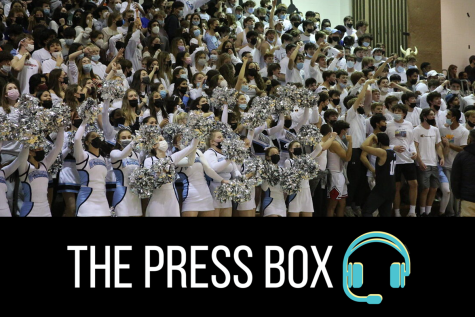If schools reopen, will students come back?
February 25, 2021
This article was published in print before the February 9 announcement to officially reopen MCPS.
On March 13, Whitman’s halls emptied. The rise of the COVID-19 pandemic forced schools around the world to shut down and move online, causing what the United Nations deemed the largest ever disruption to education systems.
The Census Bureau reported that nearly 93% of student households in the U.S. have engaged in some form of distance learning because of the pandemic. In Montgomery County, public schools plan to stay entirely virtual until at least the second semester of the school year, but that decision hasn’t come without controversy. Since the summer, government officials and school administrators have been debating the best way to keep schools running. Some feel as though schools should reopen and allow students to receive quality, in-person education, but others fear that the risk of coronavirus transmission is too high in a school environment to justify the transition.
The debate surrounding the return to in-person school is still as controversial as it was in August, at the start of this school year, with educators and parents alike adamantly voicing their opinions on the subject. But there’s still one question left unanswered: what do students think about returning to school?
The Black & White anonymously surveyed almost 900 Whitman students to collect their opinions about online learning, second semester plans and the future of education.
Is online school effective?
Since March, Whitman students have attended their classes completely online. Most students’ classes don’t start until 9 a.m. or 10:15 a.m., a contrast from the pre-quarantine 7:45 a.m. start time for MCPS high schools. Students attend class four days a week for up to four hours each day, with a 10- to 15-minute break between classes and a 75-minute lunch break.
Our survey found that many students enjoy the shorter school days. 91% percent of respondents reported being able to get more sleep and 86.3% said they like the four-day weeks. Freshman Lexi Elkin believes the later start to the school day has allowed her to sleep longer, improving her learning experience.
“I feel like I’m able to focus more when I’m fully awake in first period,” she said. “During in-person school, I would never be able to focus because I was so tired.”
The later start time and shorter school days that have come with virtual school do not necessarily translate to less stress for students, though. 51.5% of students surveyed noted that distance learning has been worse for their mental health, and 59.7% said online school has made learning more difficult.
“I can confidently say that the work in online school is a hundred times harder than physical school, which leads to a lot of stress, a lot of anxiety,” junior Diego Quijada said. “Online schooling is not about learning; it’s about meeting deadlines. These assignments aren’t there to enrich our learning.”
Learning from home instead of school has drawbacks, a Kent University study found. Students were more likely to multitask during online classes, whether it be using their phones or the Internet. Our survey pointed to a similar result: 73.2% of Whitman students surveyed believed that online school has made focusing difficult, with 36.3% reporting that online school has worsened their performance.
“When I’m in person, it’s a lot easier to communicate with teachers than it is over Zoom,” sophomore Max Di Iaconi said. “My grades have drastically gone down because, in online school, I have way more distractions.”
Yet online learning is not academically harmful for everyone; 20.2% of students said that their grades have improved during online school. For junior Julie Tilimian, setting her own pace and being in a relaxed environment in her home has helped her focus.
“I feel like online school is different for every person,” she said. “Since I’m in the comfort of my own home and the computer is sitting in front of me, I’m able to listen to teachers better. I like it more when teachers post the lessons because I can go through them myself and do the assignments at my own pace.”
The return to in-person school
At the beginning of November, MCPS announced its framework for a phased return to in-person school, with a requirement that county data report fewer than five coronavirus cases per 100,000 residents to consider a full transition back to the building for all students. But even if schools open up, will students come back?
Only 23.3% of survey takers responded that they would prefer full-time in-person school even if MCPS meets its guidelines to reopen to all groups of students. 25.1% noted they would want to continue full-time remote school, and 51.6% said they would prefer a hybrid model, where limited groups of students attend class in person for part of the week. The hybrid model is a compromise between safety and normal learning, junior Will Rasovic said.
“Staying at home is detrimental to learning, and there are so many distractions,” he said. “Since the number of students in the building would be limited, it would be safer than going back completely in person.”
Even if students did want to return, 19.9% of respondents said their families would not support their decision to go back into the school building. Whitman parent Elif Ayhan is evaluating multiple factors when deciding whether or not to send her son back to school.
“Of course we’re freaking out about COVID, but we’re also concerned about our kid’s mental health,” she said. “We wouldn’t prefer a full in-person education at all because that’s not manageable or realistic, but there has to be a way to find a solution. The most doable thing could be a hybrid system.”
Concerns and considerations
Family safety was the greatest factor for students to consider when deciding whether they would return to in-person school, with 86.1% of students listing it as a concern. Senior Chloe Eisenberg’s mom is high-risk for COVID, so safety takes precedence over other factors, she said.
“Even though it’s my senior year, I wouldn’t want to go back to school,” Eisenberg said. “I would get so scared that if I brought something back to my mom, I could, in the worst case scenario, potentially kill her.”
30% of Whitman students reported having high-risk family members, and 66.6% of students are also “very concerned” about spreading the virus to high-risk teachers and classmates.
With a return to in-person schooling, MCPS would provide guidelines for social distancing, mask wearing and staying safe while in the building. 63.5% of survey respondents are “very concerned” about other students’ compliance with required and suggested safety protocols for in-person school.
“I think it’s become a lot more normalized for people to be indoors in large groups, not wearing masks,” senior Grace McGuire said. “There are people who are immunocompromised who I wouldn’t want to get sick, so if we went back, I would be concerned that other people would not be taking the virus super seriously.”
The future of schooling
After the pandemic, it’s presumed that schools will return to “normal.” But do students even want to return to the pre-COVID method of learning?
More than a quarter of Whitman students are imagining a new future for schooling. 26.3% of students prefer a permanent hybrid model, and 4.8% would want to have online school full time.
“Now that I’ve seen what online school is like, I think that it’s really good to have a break from having to worry about what you look like or waking up early,” Elkin said. “It would be less stressful to have a hybrid schedule in the future.”
Other students, like Tilimian, feel that if school is permanently virtual for future generations, it would keep students from reaching their academic potential and fully experiencing high school.
“I think it’ll be more beneficial for future students to go to school in person because I think it’s more of an experience,” Tilimian said. “You learn a lot from school, not only knowledge-wise but socially. You need those social skills for your whole life.”
The pandemic has provided schools with an opportunity to reimagine education. But no matter what the future looks like, this pandemic will never be forgotten, Quijada said.
“This pandemic has given everyone a new perspective on life,” he said. “For the near future, at least, a new normal will be defined. I think that in many ways, these times will go down in history books.”







